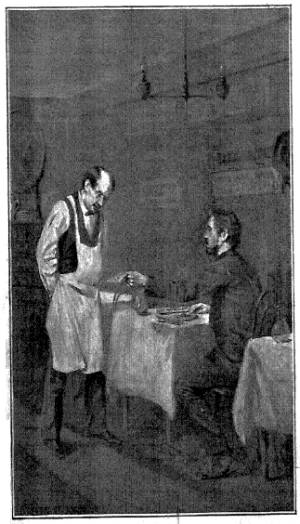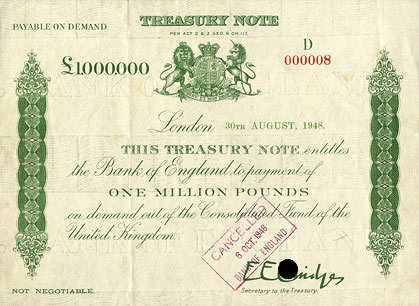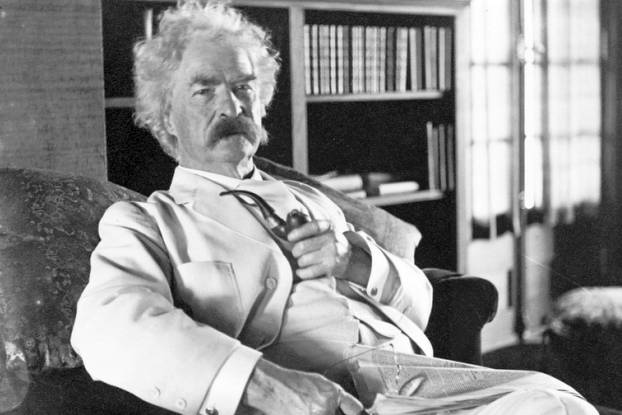Imagine for a second that you have accidentally acquired an object of immense value, or a stash of immense wealth; a fortune that is not legally yours and one you can only admire privately; a fortune, which you cannot personally sell or encash for the fear of getting caught up in legal muddles; a fortune that will have no takers even if donated freely; then what will be this fortune to you? It will be an immense burden, right? Nah… Not for Harry Adams.
So who is ‘Harry Adams’? Well, he is the hero of our story, ‘The Million Pound Bank Note’ written by Mark Twain originally in 1893; an old fashioned tale, which inspects the real meaning of money and fairness in one’s character over the possession of wealth narrated with a fair dosage of Twain’s signature satire. The story is set in London and we can glimpse the realistic nature with which the author represent the social and economic thoughts of the time in the characters that he create, in ‘The Million Pound Bank Note’.
In the beginning of the story we meet a young Harry Adams – who was a clerk with a mining-broker at San Francisco – walking penniless and in rags through the streets of Victorian London as the victim of a freak boat accident, which took him away from his comparatively comfortable job and life in America. We meet him as an absolute stranger in town with no money, desperately fighting against hunger pangs when he gets acquainted with two immensely rich eccentric brothers.
what will happen to a honest & intelligent person when he comes in custody of a million pound bank note, with nothing else in his possession
These brothers were arguing about ‘what will happen to a honest & intelligent person when he comes in custody of a million pound bank note, with nothing else in his possession’. One brother was the opinion that such a man, with no way to prove the manner in which he came into possession of such a heavy value bank note, will die of hunger, while the other brother was of the opinion that such a man will survive on the mere symbolic ownership of such a vast wealth. To settle their argument they decide on a wager and it was in these circumstances that our hero meets them. They gift him with an envelope and sends him away asking him to open the envelope once he is back at his place of residence.
Finding a bank note within the envelope Harry decides to have a square meal at a dining place and gets the shock of his life when he finds that the bank note that was given to him was actually of the value of one million pounds. When the owner of the diner finds that Harry is in possession of such a heavy denomination bank note, he refuse to take money from him thinking of Harry as a millionaire and beg him to dine at his establishment during his stay in the town with an infinitely extended credit. From the letter Harry learns about the bet between the brothers and that he has to meet them exactly after one month and then they will reward him with a job on the successful completion of the bet.

From a man who was longing for a discarded pear at the gutter for satisfying his hunger, the possession of the bank note changes things drastically for Harry. Overnight he becomes the ‘notoriety of the metropolis ’ and ‘the eccentric foreigner’ who carries million pound bank notes in his pocket, and every establishment in town was extending Harry with unlimited credits. In the society columns of newspapers he becomes the ‘vest pocket million pounder’ and even the Punch magazine celebrates him with a caricature within their magazine. The mere possession of this million pound bank note opens every door for Harry. And when he gets invited to a dinner party featuring the cream of London’s social circles, he meets the beautiful Portia Langham and it is there the real story of Harry’s success begins. Twain’s narrative is slick and is loaded in humor as he presents the reader with the rest of the story about Harry’s life and his success in gaining wealth, social acceptance and love of a beautiful girl all leading to a surprising climax.
A bank note of a million pound denomination – Did they ever exist?
The plot of the story of ‘The Million Pound Bank Note’ revolves around the sheer impossibility of encashing a heavy value bank note by a common man. Within this story it is narrated that only two such notes were ever issued and any one who walks into a bank to cash that note will be walking himself into a legal tangle with the prospect of jail term. So, does such million pound bank notes really exist? Lets do a bit of digging around for the purpose of satisfying the curiosity over this question.
Such Higher value pound bank notes do exist, and they were usually used for transactions within the banks. The Bank of England uses the ‘one million’ and ‘hundred million’ pound bank notes to maintain the parity with bank notes issued by Scottish and Northern Irish bank notes. These notes – the one million ones are called ‘giants’ and comes in A5 size and the hundred million ones are the ‘titans’ having an A4 size – are more like IOU documents and they are special issues from Bank of England to meet the requirement of backing pound for pound the notes issued by banks in Scotland and Northern Ireland.

Nine such one-million pound notes were issued in connection with the ‘Marshall Plan’, corresponding to the loan from US after the World War II in 1948. After cancellation, of these nine only seven were destroyed and two survived with private collectors. Such high value notes are not usually found in the normal transactional scenes and it is believed that notes worth eight billion pounds were printed in these heavy denominations in total.
Back to our story…
Twain can generate humor from narrations of unrealistic and often absurdly simple situations and ‘The Million Pound Bank Note’ is a nice example for his storytelling abilities. Even though personally I have a lot of objections towards many of the viewpoints that Mark Twain held in his personal life and his outlook towards many worldly matters, I admire him as a narrator who can keep the readers engaged using clever plots and witty situations. The way in which he reflects the time period of the narrative within his narrative is another applaudable factor. ‘The Million Pound Bank Note’ can be a delight for those who love charming stories.
By: Pramod Shivram





